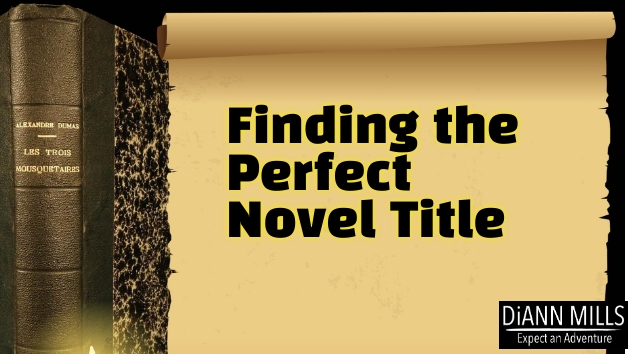By DiAnn Mills @DiAnnMills
It’s been said that “a book’s title is its most important marketing strategy.” I shouldn’t be surprised when I consider how long it takes me to create a title for a book. I keep a file of titles, and still I end up in a dilemma. My purpose is to think of my title as a magnet, a powerful attraction to readers.
These famous novels didn’t start out with a luring title:
- First Impressions → Pride and Prejudice (Jane Austen)
- Something That Happened → Of Mice and Men (John Steinbeck)
- Atticus → To Kill a Mockingbird (Harper Lee)
- Tomorrow is Another Day → Gone with the Wind (Margaret Mitchell)
- Stranger From Within → Lord of the Flies (William Golding)
- All’s Well that Ends Well → War and Peace (Leo Tolstoy)
- They Don’t Build Statues to Businessmen → Valley of the Dolls (Jacqueline Susann)
I have 5 criteria in helping me choose the perfect book title:
1. Unique
- I search on Amazon, Barnes & Noble, and Christian Book to make sure my title isn’t currently showing up on other book covers.
- If my title does appear, how recent is the publishing date?
- Is the title in my genre?
2. Genre
- The reader should know the genre immediately.
3. Memorable
- Does my title reflect the storyline that the reader will view as unforgettable?
- Easy to remember or catchy.
- Short.
4. Emotion-grabbing
- Does my title grab the reader’s emotions?
5. Keyword searchable
- I type my title into a search engine to see what comes up.
- Are the results related to my story topic?
What are some additional guidelines for creating a strong title?
- Use strong nouns and active verbs
- To Kill a Mockingbird – Harper Lee
- The Eagle has Landed – Jack Higgins
- Watership Down – Richard Adams
- Look to figurative language: metaphors and similes
- Examine my story’s theme.
- Brainstorm.
- I consult friends for help.
- I don’t discard any random titles because one day I might need them.
- Create a new word, especially if the novel is fantasy or sci-fi.
- Read poetry – Figurative language offers insight into the genre, emotions, and quality.
- The Lovely Bones by Alice Sebold came from “I Knew a Woman” by Theodore Roethke
- Of Mice and Men by John Steinbeck came from “To a Mouse, on Turning Her Up in Her Nest with the Plough” by Robert Burns
- Tender is the Night by F. Scott Fitzgerald came from “Ode to a Nightingale” by John Keats
- For Whom the Bell Tolls by Ernest Hemingway came from “Meditation XVII” by John Donne.
- Songbooks or hymnals – Composers labor over their song titles and lyrics. Like poetry, the language is beautiful and might just fit what I need. The Tie that Blinds.
- Don’t Stop Belivin’ by Olivia Newton-John came from a Journey song by the same name.
- We are Family by Patricia Hegarty came from a 1970’s song by Sister Sledge
- I found this online: John Steinbeck’s wife Carol Steinbeck provided the title to John’s 1939 novel and masterpiece, The Grapes of Wrath. The title is a direct reference to lyrics in the second line from “The Battle Hymn of the Republic”, by Julia Ward Howe, which was based on a passage from the Bible in Revelation.
- Also, specific lyrics from this song provide the title of John Updike’s novel, In the Beauty of the Lilies. Two more titles: Terrible Swift Sword and Never Call Retreat come from this song. They are volumes in Bruce Catton’s Centennial History of the Civil War.
- Alliteration – Repetitive use of a letter for each word of the title.
- Horton Hears a Who by Dr. Seuss
- Many Marvelous Monsters by Ed Heck
- Black Beauty by Anna Sewell
- Answers a question that must be answered
- Are You Afraid of the Dark? – Sidney Sheldon
- Can Love Happen Twice? – Ravinder Singh
- They Shoot Horses, Don’t They? – Horace McCoy
- One-word titles or choose a name
- Frankenstein by Mary Shelley
- Rebecca by Daphne Du Mauer
- Twilight by Stephenie Meyer
- Harry Potter by J. K. Rowling
- Clichés – If I choose a cliché, I want to make sure it corresponds to the book’s genre and content. Switch up a popular cliché or phrase.
- Don’t Look Down by Hilary Davidson
- Love is Blind by Linsay Sands
- The Grass is Always Greener by Michele Jakubowski
- Make a reader promise – This is popular for nonfiction books too.
- And Then There Were None by Agatha Christie
- The Hunger Games by Suzanne Collins
- The Lion, the Witch, and the Wardrobe by C. S. Lewis
- Research and setting
- Where the Crawdads Sing by Delia Owens
- The Bridges of Madison County by Robert James Waller
- The Bridge on the River Kwai by Pierre Boulle
- Subtitles are more for nonfiction books.
- Online Title Generators
Finally, how will my novel title be used?
- To entice a reader to buy the novel.
- To create blog posts and articles.
- To develop a speech.
- To promote contests and giveaways during book launch.
- To expand visibility. Coming soon!
- To advertise and market.
- To create a Pinterest board.
- To attract book clubs.
- To use on promotional materials.
- To invite book reviewers.
- To brand and enhance the author’s platform.
If you are writing or thinking about writing a book, what title tips would you give?


